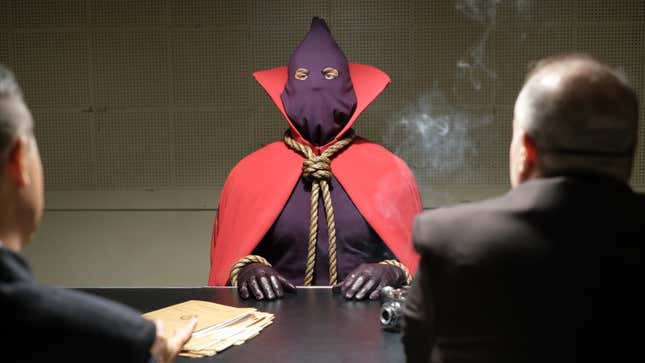
Writer’s Note: Major spoilers ahead for Season 1 of Watchmen, including the season finale.
What has been heralded as one of the greatest seasons of television has now ended and we’re still left with a bunch to unpack. HBO’s Watchmen is one of those shows that leaves you thirsty and obsessed with revisiting every missed Easter Egg and plot device through a re-watch.
One of the primary aspects of the show was its bold choice to directly combat white supremacy. From the very first series of frames chronicling the tragically violent and destructive Tulsa Race Massacre of 1921, Watchmen has not shied away from the most uncomfortable aspects of race relations in America. In Episode 6, titled, “This Extraordinary Being” the heroic mystery man??? known as Hooded Justice is revealed to be Will Reeves (Louis Gossett Jr.), a black man. Show creator Damon Lindelof confirmed the idea of that particular racial switcheroo came to him “around Christmastime of 2016.”
“For a while, in my twenties and thirties, I imagined he was horribly disfigured,” Lindelof told Rolling Stone. “That’s why he wore the hood. That problem-solving was happening in my brain at the same time I read “The Case for Reparations” and first learned about Black Wall Street, and that started to feel like, in comic-book origin-story canon, like Krypton. But then I was like, “Whose origin story? It would have to be a young black child that grows up to be a superhero. Oh, that’s Hooded Justice! That explains everything. That explains his costume, that explains why he hid his face.” And more importantly, I’ve already acknowledged that I’m telling a story whose meta-theme is appropriation because I’m appropriating the original Watchmen. What if superhero-ing is an idea that was first hatched by a person of color for reasons of true justice, and then white people appropriated it for their own masquerade adventures? That felt completely and totally right to me.”
Speaking of making iconic characters black, Cal Abar (Yahya Abdul-Mateen II) as Dr. Manhattan was pretty damn huge, but it was the season finale that presented the possibility that Angela Abar (Regina King) would be taking over his god-like powers when he was destroyed. The “I Met God, She’s Black” merchandise would take on a different life!
“I intended it to be just as much of an ending as the original Watchmen is,” Lindelof confirmed, referring to the 2009 film. “There is certainly a story to be told about whether or not Seymour publishes Rorschach’s journal and undoes everything that Veidt just intended to do. But that’s not a story that I think would be particularly interesting. Let’s for a second assume that there are two possible outcomes for what happens when Angela takes a step onto the swimming pool. Outcome number one is that she just sinks to the bottom of it and just misunderstood everything that Cal told her and ate a raw egg and should probably go be treated for salmonella. Outcome number two is that she starts to walk on water and realize that she is imbued with godlike powers. That would certainly explain the promotional poster for Watchmen that we put out there 15 weeks ago; she’s certainly looking a bit blue there. Let’s just say either of those possibilities exist. I think neither one of those stories are going to particularly make for a compelling season of television. Others may disagree. But that’s my feeling.”
“But if Angela, in fact, ended up with Manhattan’s abilities — and I’m just saying, again, it would be pretty lame if she didn’t — I think that white supremacy is in trouble,” Lindelof noted.
And I think, in that one statement, Lindelof just made the greatest case for a Season 2 of Watchmen. Get the fuck up on the pool.

